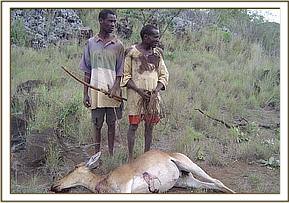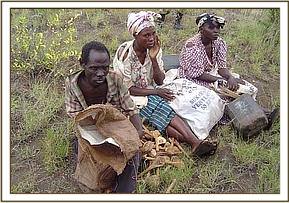Participants
Patrick Mutuku
Henry Lekochere
John Mungai
Julius Mutamu
Gerald Maghanga
2 KWS rangers
Area Covered
The areas patrolled this month were Umani Springs, the Kenze and Kinzili hills, Mukululo, Kari Farm, Kaunguni and Kiboko
TOTAL SNARES COLLECTED 509
Findings
Most of the snares that we lifted this month targeted large game. The reason for this being that due to the continued poaching of small game there is very little of the small game left. A total of 509 snares were lifted and 22 arrests made.
The arrests consisted of individuals who were poachers, charcoal burners and wood carvers.
The snares that were set at the Umani Springs camp were found to be concentrated at the periphery of the nearby swamp, which is a source of water for the wildlife in the area. The snares were set along the various trails that lead to the swamp. At a distance of two kilometers from the Umani Springs camp we found an entry route used, on a daily basis, by approximately 10 poachers. At the Kenze and Kinzili hills we found a road which has been forraged by charcoal burners. Lorries have now begun to use this road to access the park, thus further widening it. It was in this region that we found more than 100 sacks of charcoal which had been prepared by the charcoal burners and were awaiting collection.
Sadly when we patrolled Mukululo we found that the communities in that area had already done a lot of damage to the wildlife near and around the park boundary. Because of this the poachers have advanced deeper into the park to set their snares. They now erect fences, forming an enclosure, into which they set snares. Using bows and arrows and dogs they chase the wildlife into these enclosures, effectively trapping and snaring the game. Around the waterholes we found platforms erected by poachers. From this high vantage point the poachers have a good view of all game coming to drink at the waterhole, shooting poisoned arrows at the game in order to kill it.

When patrolling Kari farm we were saddened to discover that the farms employees are not only setting snares but are also co-operating with the poachers in order to catch, snare and kill animals using the lamping method. This is very distressing as Kari farm has a water source whith the wildlife visit, which makes the wildlife an easy target for the poachers.
The rate at which the Chyulu ecosystem is being destroyed is very upsetting. Initially the ecosystems balance was jeopardized by volcanic activity and the ever increasing presence of humans in the area. Once the humans were evicted in 1997 the Chyulu region started to show some signs of recovery. This recovery has not lasted long due to wood carving and charcoal burning which is depleting the trees in the area.

In order to preserve the Chyulus the communities need to be sensitized about wildlife conservation and the need to protect the environment and their natural heritage.
The roads in the Chyulu national park are in poor condition and need to be repaired. The state of the roads, together with the rocky and rugged terrain, means that patrols can not be carried out effectively. Despite these obstacles the rangers at Mukululo are very dedicated and take their work seriously doing all that they can to help conserve the wildlife and the environment around them.
Report by Patrick Mutuku








